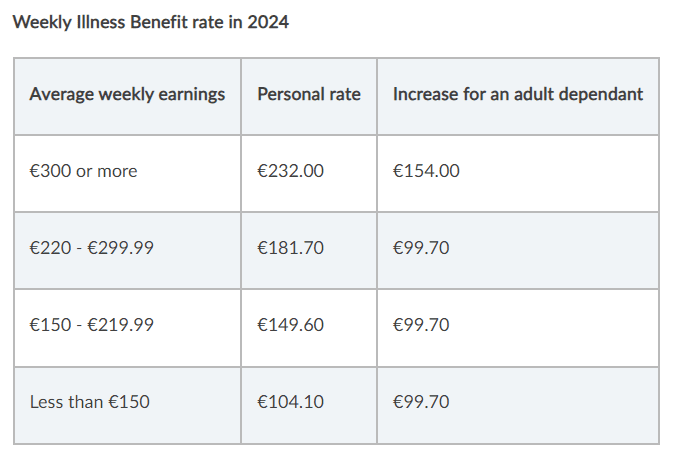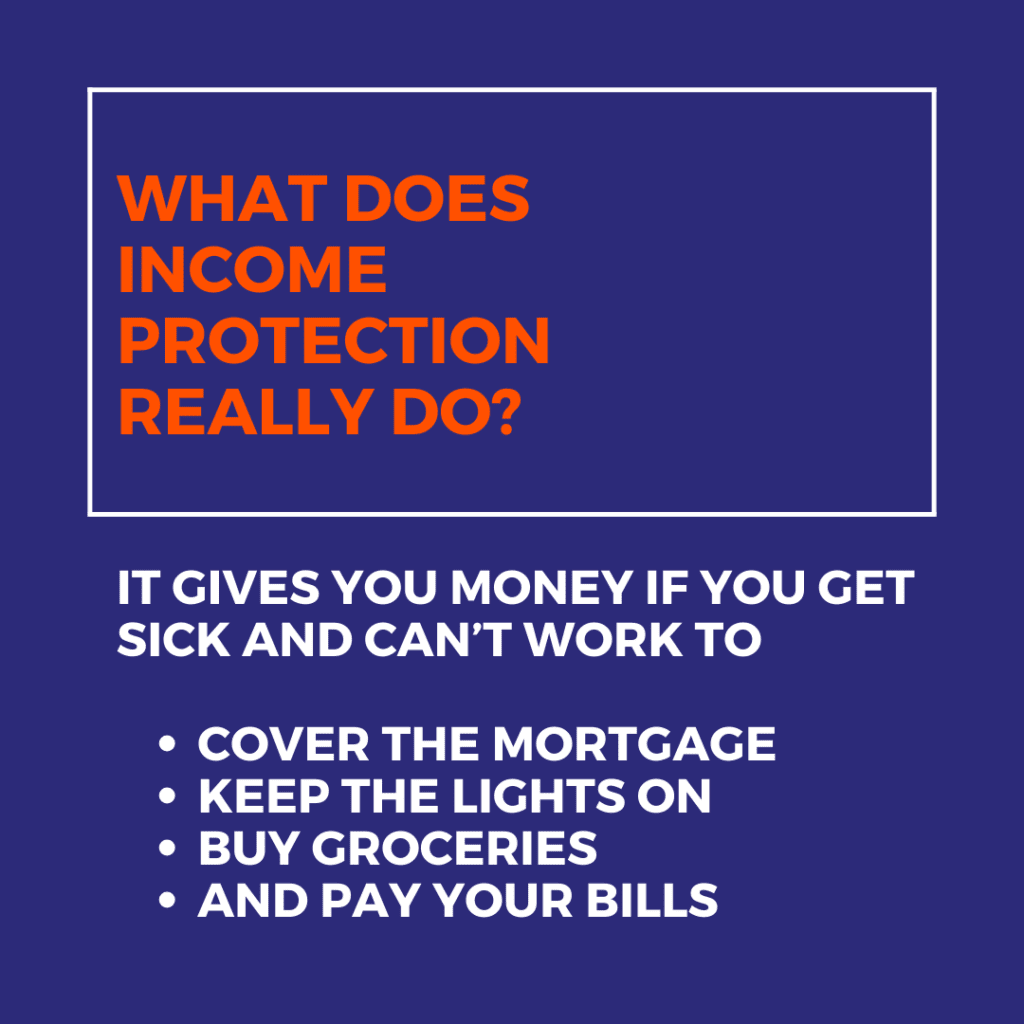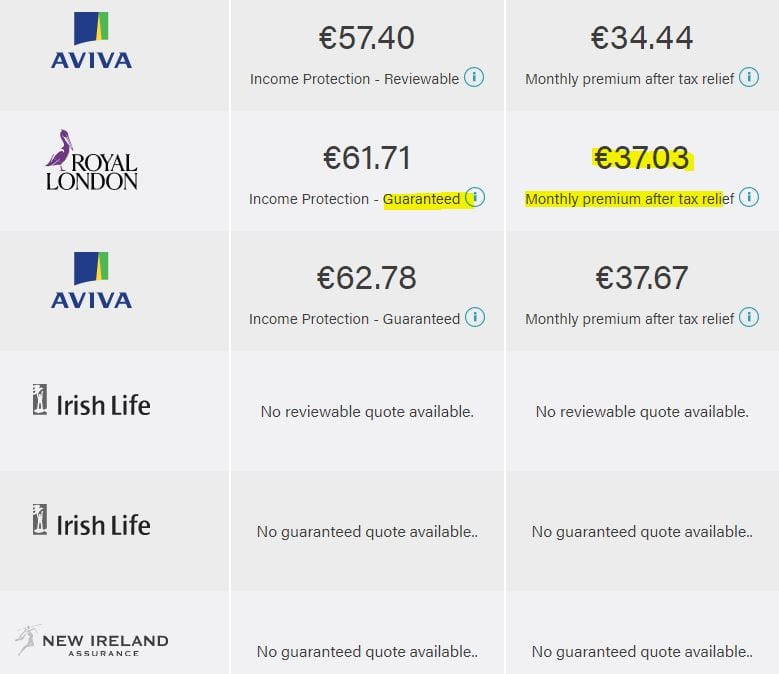So, you’ve lived in your parents’ box room for 18 months, scrimped and saved, and finally have the deposit in your bank.
You’ve found a gaff you want to buy, been mortgage approved, and just went sale agreed.
Exciting times ahead!
But before you start planning trips to IKEA, there’s an important reality check we need to discuss:
What happens if you get sick and can’t work?
Yeah, I know; sorry to put a downer on things, but the next few sentences are the most important ones you will read today.
Shit Happens: Be Prepared
Look, life is unpredictable.
You might be fit as a fiddle today, but no one has a crystal ball to see how tomorrow or the next day will turn out.
Illnesses and accidents usually strike when we least expect it.
The last thing you want is to deal with the stress of losing your home while you’re trying to get better.
The Financial Impact of Being Unable to Work
Your regular income will nosedive if you’re out of work due to illness.
Fingers crossed, your employer will pay you for a while, but most Irish employers are tight as shite, so they will only offer you the bare minimum of 5 days of sick pay.
So what happens then?
Well, the bank will be understanding for a while, but if you can’t pay the mortgage, they will soon put the squeeze on you.
And trust me, nobody wants to deal with that kind of stress on top of being sick.
My Partner Will Pay The Mortgage
If your other half is on the mortgage, their monthly pay cheque may be big enough to pay the mortgage, but what about the other bills?
And even more importantly, will there be money left over to pay for the fun stuff – the stuff that makes life worth living?
The State Will Take Care of Me!
Yeah, good luck with that.

Could you pay your mortgage and keep your house if your income dropped to €232 weekly?
Let’s say you currently earn €50,000, taking home over €700 per week.
If you’re struggling to make ends meet at €700 per week, imagine how hard life would be on €232!
Even if you could cover the mortgage, what about everything else?
- Food
- Utility Bills
- Holidays
- Broadband
- Clothes
- Childcare
You’re not alone if this conversation gives you the willies (what a class phrase btw).
We all worry about paying the mortgage.
That and leaving the immersion on (maybe it’s an Irish thing)
But instead of sitting in a mess of stress, waiting for illness to strike you out of the blue, you can do something about it!
Emergency Savings: Your Financial Cushion
Before you blow all your cash on an 86-inch TV, think about putting an emergency fund in place.
Yeah, I know, sooooooooo boring, but look, you now have a decent savings habit, so don’t let that slide.
Aim to save three to six months’ living expenses, including mortgage payments.
This fund can be a lifesaver if you are out of work for a while.
It gives you a buffer to cover essential expenses without using credit cards or loans or having to beg someone else for financial help!
Protect Yourself with Mortgage Payment Insurance
But, no matter how much you save, you won’t be able to put enough away to cover a long-term absence from work.
So here’s the best, simple solution: insurance.
Specifically, mortgage payment insurance AKA income protection insurance.

If you can’t work due to illness or injury, this policy will pay you a replacement income to pay your mortgage and all your other bills (and the fun stuff).
Think of it as a safety net that takes away money worries while you focus on getting better.
How Much Does Mortgage Payment Insurance Cost?
Your income protection payment will continue to pay you a replacement income of up to 75% of your salary for as long as you can’t work.
You can use this payment to pay your mortgage and keep your home.
Let’s look at some figures to see how much this stuff costs.
Using €50,000 as your income, I’m making you a 35-year-old, non-smoker working a desk job. Hurrah!
You want to insure up to the maximum of 75% of your income, which will give you enough to pay the mortgage and maintain your current lifestyle:
Quote Type: Income Protection
First Person: Non-Smoker, born on 10/05/1989
Cover Amount: €26,944 per year until age 68 (you can also claim illness benefit of €12,064)
Occupation Class: Software Consultant (Class 1)
Deferred Period: 26 weeks

What is the Total Cost of a Mortgage?
If you’re getting a mortgage for the first time, you might be obsessed with the actual monthly mortgage repayment.
But don’t forget to budget for other essentials like house insurance, mortgage protection, and insurance that will pay the mortgage if you get sick and can’t work.
You should allow for these as part of the overall cost of buying your new home.
Total monthly cost of the mortgage
Mortgage repayment €1300
+ house insurance €30
+ mortgage protection €20
+ mortgage payment insurance €50
= €1400 per month
Look, I know money is tight when buying a house, but as your income increases, these costs are fixed, so they will seem less expensive as time passes.
This begs the question:
Should I go for basic mortgage protection now and put income protection in place in the future when I’ve settled in and am used to paying the mortgage?
I’m sorry, but…

You may have the best intentions of returning and implementing income protection, but you won’t.
Nobody has ever jumped out of bed one morning and said,
Today’s the day I’m going to get me some income protection
It’s never happened, and it never will.
You get three chances to sort this stuff out:
- When you’re getting a mortgage
- When you’re having a baby
- When you’re changing jobs
The only other times people come to me for income protection are when they think they might have to claim because they have found a lump, are feeling stressed at work, or have a headache that won’t shift.
Unfortunately, it’s too late at that stage.
How Does Income Protection Work for a Mortgage?
The beauty of income protection is in the simplicity of how it works.
If you can’t do your job, I stress your job, not any job, for longer than your deferred period, the insurer will pay you a replacement income that you can use to pay the mortgage.
You will continue to receive a payout until you return to work or until the end date of your policy.
So yes, it covers ANY illness or accident that stops you from doing YOUR JOB.
To claim, you’ll need a sign-off from your GP, of course.
Unlike serious illness cover, which we’ll discuss below, income protection pays out for mental health issues like anxiety and depression that stop you from doing your job.
It also covers neck pain, backache and other (fancy word alert) musculoskeletal injuries that prevent you from working.
Of course, the big, bad, scary ones like cancer, heart attack and stroke are also covered as long as they stop you from working.
The caveat is that pre-existing conditions are excluded.
So, if you have a dodgy right knee that has been giving you some grief over the last few years, you’ll probably get a right knee exclusion. This means if you can’t work due to pain in your right knee, you can’t claim.
If the insurer adds an exclusion to your policy, you’ll know about it before you sign up. It’s not like they can exclude stuff out of the blue when you make a claim.
And on top of the icing, on top of the cherry, on top of the cake, you get tax relief on your premiums.

So, let’s say your premiums are €100 per month. After-tax relief, you’ll only pay €60 if you’re a higher-rate taxpayer.
Five insurers offer mortgage income protection
- Aviva (recommended)
- Royal London
- New Ireland
- Irish Life
- Zurich
Here’s how to compare the Irish income protection providers
What if I Don’t Work in an Office?
The cost of mortgage payment insurance depends on what risk class your occupation falls into.
The classes rank from 1 to 4.
The insurers rank occupations based on their history of claims and the risk of injury in that occupation.
Class 1 is your standard desk jockey. Me, for example.
Class 2 is an occupation that involves some light manual labour—a dentist and a sales assistant fall into this category.
Class 3 involves non-manual and manual occupations. Teachers, Nurses, midwives – you get the gist.
Class 4 is manual labourers. This includes jobs like general operatives, builders, and tradesmen.
If you fall into Class 3 and Class 4, expect your premiums to be more expensive.
However, Wage Protector is here to make things a bit easier on your póca:
Affordable Income Protection (AKA Wage Protector)
Over to you
Don’t get lost in the frenzy of buying your forever home without making plans for being able actually to pay the mortgage if you get sick.
If you can’t pay the mortgage, your forever home will quickly become your temporary home. 😔
Yes, the bank will understand for a while, but eventually, they will turf you out if you can’t pay the mortgage.
And even if you manage to stay put, the stress of the constant fighting with the bank will wear you down and ruin your life.
Do “future-you” a favour and invest in your financial resilience by taking out a mortgage payment insurance policy.
Please complete this questionnaire if you’d like me to review your personal situation and email you a no-obligation recommendation.
![]()
Best of luck with the whole house-buying process. I remember how stressful it was.
You’ll get there eventually!
Thanks for reading
Nick
Editor’s Note: We first published this blog in 2020 and have regularly updated it



